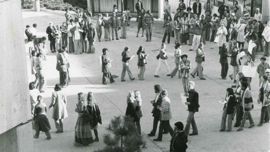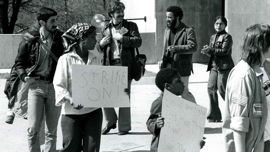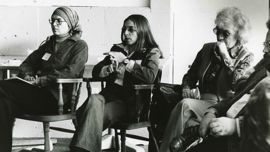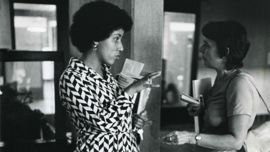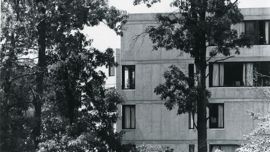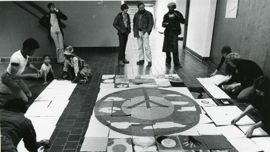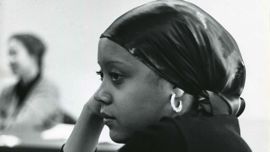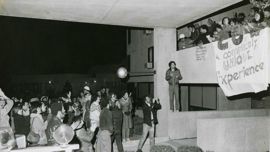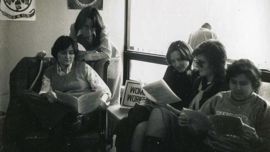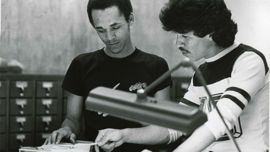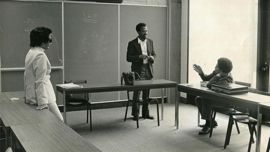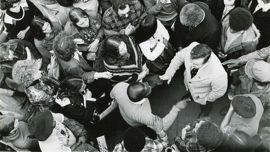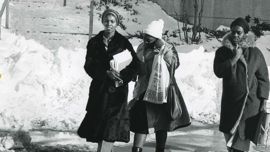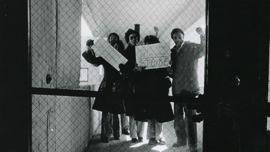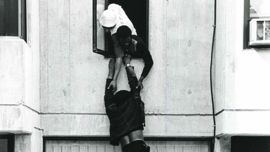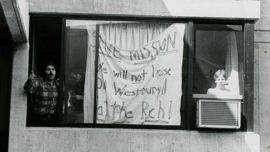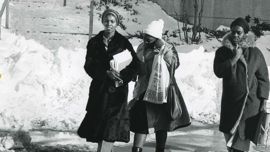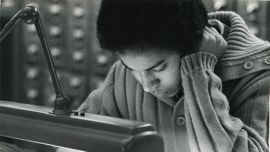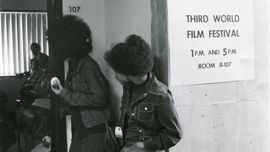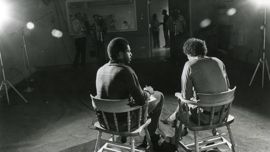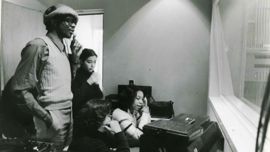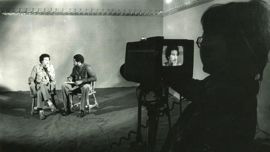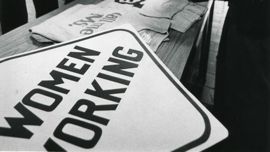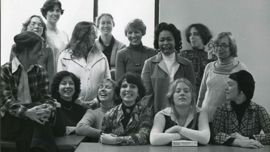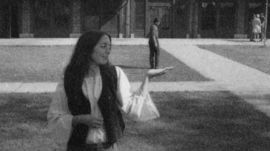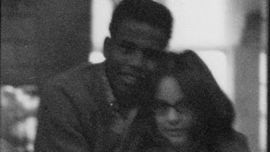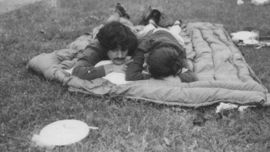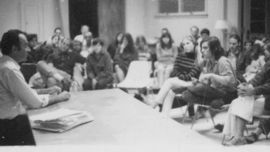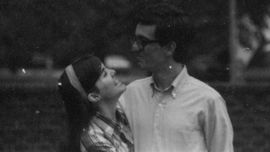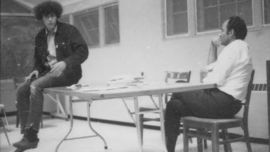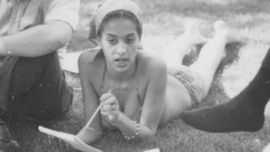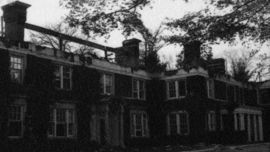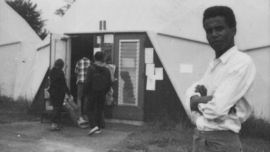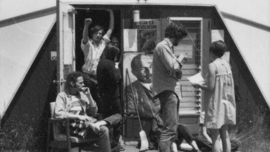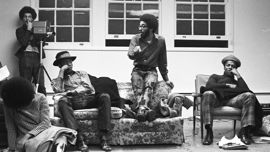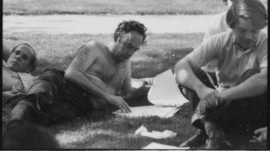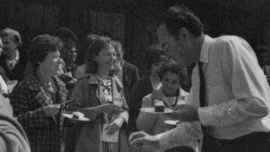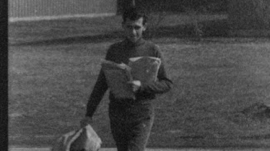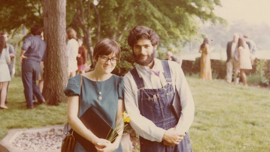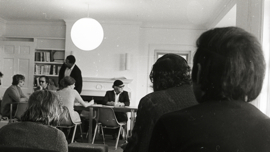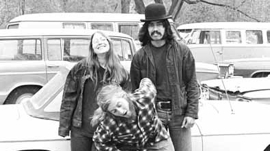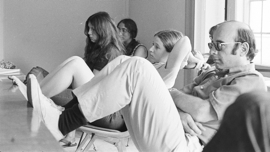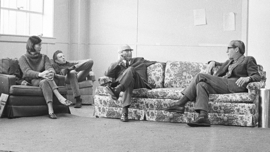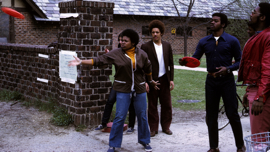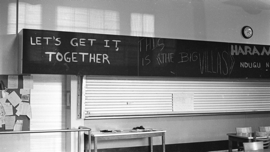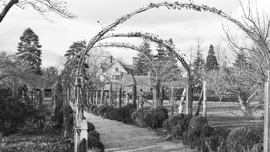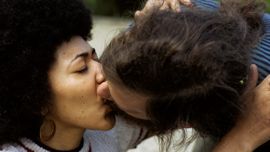Calvin O. Butts became the President of SUNY College at Old Westbury in September of 1999. Along with his Presidency at the College at Old Westbury, Dr. Butts continues as Pastor of the Abyssinian Baptist Church in the City of New York, one of the nation’s most historic churches. Dr. Butts was raised in Manhattan and Queens, and attended Atlanta’s Morehouse College where he received a B.A. in Philosophy. Later he earned a Masters of Divinity from Union Theological Seminary, and a Doctorate of Divinity from Drew University, with a focus on Church and Public Policy. Dr. Butts is recognized around our nation and the world for his work as an educator, minister, and human rights activist. His advice has been sought by U.S. Presidents, industrial elite, and community and religious leaders from around the world. Over his more than 40 year career as a human rights activist and advocate, Dr. Butts has had a pervasive impact on such wide-ranging community development initiatives homelessness, senior citizen and youth empowerment, and cultural awareness.
C
andida DeLuise was the first member of her family to go to college when she was admitted to the State University of New York College at Old Westbury in 1968. Brought up in Brooklyn by Italian-American parents, DeLuise was attracted to Old Westbury’s experimental curriculum. During her time at Planting Fields she volunteered at a drug treatment center in Greenwich Village, participated in feminist consciousness-raising groups, and became involved in theater and film programs. Her education, which included this direct community action, distanced her from campus unrest at Old Westbury. She transferred to the University of Colorado where she received her BA in Urban Studies, and later received her masters in clinical social work from Virginia Commonwealth University. She accredits her non-traditional psychotherapy practice to the non-traditional and Eastern influences she was introduced to while at Old Westbury.
E
lizabeth Ewen, awarded SUNY’s Distinguished Teaching Professorship, taught at the State University of New York College at Old Westbury for over thirty years. She was raised on Long Island by politically progressive parents. Her father, who she describes as an Anglo-American anarchist, and her mother, a second-generation Italian-American, met at an American Labor Party dance. Ewen attended college at the University of Wisconsin-Madison, where she began her PhD studies. She was a student activist: attending SANE rallies, anti-segregation actions at Sears Roebuck, and anti-war demonstrations, and she worked as an organizer for the Congress of Racial Equality (CORE) at Chicago’s Freedom House. After the birth of her two sons, she went on to complete her PhD at Stony Brook University.
In 1974 she was hired as a member of the American Studies faculty at State University of New York College at Old Westbury. As a pioneering social historian she advocated for a general education curricula that emphasized the traditional canon and a critique of the canon based on popular insurgencies—the dialogue and conflict between those in power and those who challenge it. Ewen helped organize and teach one of the first Women’s Studies courses in the country.
She is the author of Immigrant Women in the Land of Dollars: Life and Culture on the Lower East Side 1890-1925, and co-author of several books including Channels of Desire: Mass Images and the Shaping of American Consciousness (1992) and Typecasting (2006), both with Stuart Ewen, and Picture Windows: How the Suburbs Happened, (2000), with Rosalyn Baxandall.
F
rancis Koster, was born and raised in Lakewood, Ohio. The son of a fireman, Koster was the first in his family to attend college. He joined the Peace Corps and was a member of the fourth group to go overseas where he was stationed in Tanganyika and then Sierra Leone. In the Peace Corps he was introduced to future State University of New York College at Old Westbury President Harris Wofford, who recruited him as a student planner. Koster graduated from Old Westbury in 1971, as “graduate number one.” He received his PhD in education from the University of Massachusetts at Amherst. Until 1981 he worked for the Tennessee Valley Authority in support of solar and wind energy, afterwards he began working in health care. He now leads The Optimistic Futurist, a website devoted to sharing cost-effective solutions to America’s problems.
D
eborah Leavy, was attending Baldwin High School when she was called upon by State University of New York College at Old Westbury President Harris Wofford to help plan the new college that first opened in Planting Fields. A Long Island native, Deborah grew up in a liberal, pro-union household. She taught students during the 1968 Ocean Hill-Brownsville strike as part of Old Westbury’s community action education, an experience that she describes as challenging liberal orthodoxies. She credits her time at Planting Fields with instilling her with a lifelong passion for learning, and ability to evolve professionally. After attending Old Westbury, Deborah went to Yale Law School, and worked for the American Civil Liberties Union and the U.S. House and Senate. She has since retired from law and now resides in Philadelphia where she has received multiple awards as a professional artist.
J
ohn D. Maguire was the president of State University of New York College at Old Westbury from 1970 to 1981. Maguire, a Fulbright Scholar at the University of Edinburgh, graduated from the Yale Divinity School. He next pursued a joint PhD in Theology and Psychiatry, also at Yale. Maguire participated in the Freedom Rides and worked closely with Dr. Martin Luther King Jr., who he first met when they roomed together at a retreat at the Crozer Theological Seminary. He is a permanent trustee of the Martin Luther King Jr. Center for Social Change in Atlanta, GA.
After a reorganization of State University of New York College at Old Westbury in 1970, following a student strike and the resignation of the first President, Maguire stepped in to form what he described as the “New College at Old Westbury.” Maguire emphasized social justice as the college’s mission, including an explicit commitment to a racially diverse student body. Maguire also promoted a focus on interdisciplinary education. After leaving SUNY College at Old Westbury, Maguire served another seventeen years as a college president at the Claremont University Consortium and Graduate University. He currently serves on the board of the NAACP Legal Defense and Education Fund, and Union Theological Seminary.
G
hebre Selassie Mehreteab immigrated to New York from Eritrea in order to pursue an undergraduate degree at State University of New York College at Old Westbury. Mehreteab was recruited to Old Westbury by Harris Wofford, head of the Peace Corps in Ethiopia and the college’s founding president. Old Westbury was Mehreatab’s “Ellis Island.” His middle-class family background little prepared him for the polarization of U.S. society, and the radical, experimental environment at Old Westbury. He completed his undergraduate degree at Haverford College, where he has also been awarded an honorary degree. Since graduating, Mehreteab worked as a program officer for the Ford Foundation, where he is currently an advisor. He was tapped by the National Housing Partnership, a congressionally chartered organization, to lead the organization, and initiated its foundation, the NHPF, which he headed for twenty years, until 2009. The non-profit NHPF has provided affordable housing for 25,000 residents in over eleven states.
F
rank Miata, Frank Miata was brought up on the South Shore of Long Island. He was the first in his family to go to college when he attended State University of New York at New Paltz. He was the upstate New York regional organizer for Students for a Democratic Society. Looking for “rest and relaxation,” after being assaulted by police during an anti-war demonstration, Miata decided to transfer to the small, experimental State University of New York College at Old Westbury in 1968. He soon bumped heads with college administration, believing college president Harris Wofford was attempting to co-opt students into the system. A self-proclaimed radical, Miata was a leader in the student takeover of Planting Fields campus in 1969 and coined the phrase “paranoia is true perception.” He graduated from Old Westbury in 1971 and went on to teach political science at Adelphi University. He later became a college administrator at New York University and Pratt University and remains dedicated to social justice.
C
arlos Russell was born in Panama’s Canal Zone. In 1955, Russell immigrated to the United States on a student visa to attend De Paul University in Chicago. In attempting to leave behind what he described as Panama’s “rampant racism,” he was forced to confront the reality of a deeply segregated and discriminatory U.S. society. After graduating, Russell worked for the Mary McDowell Settlement House in Chicago and the Albany Community Center as part of government-sponsored anti-poverty efforts. A cultural activist as well, Russell was also a member of the Harlem Writers Guild, and a writer and Associate Editor for the Liberator magazine. He consulted with Martin Luther King Jr. in early planning for the Poor People’s Campaign, and is a noted founder of Black Solidarity Day, first initiated in 1969.
Russell became the chair of the Field Studies Department at State University of New York College at Old Westbury in 1968. He had a strong influence on students in the urban action programs, inspiring and challenging students involved in the formation of the Young Lords. Immediately after Old Westbury, Russell moved to Brooklyn College, where he went on to become the Chair of the Department of Educational Services, Director of SEEK and Dean of the School of Contemporary Studies. He has a PhD from the Union for Experimenting Colleges. Later in his life he served as Panamanian Ambassador to the United Nations, and also to the Organization of American States. Russell continues to write poetry, plays, and political commentary.
S
amuel Von Winbush, Samuel Von Winbush is a celebrated African-American chemist, originally from Henderson, North Carolina. His grandmother was among the first generation out of slavery; she could neither read nor write. Von Winbush’s quest for knowledge was inspired by his grandparents’ respect for education, and their deep sensitivity to and knowledge of the natural world—they mastered farming, midwifery and healing skills. A child of the segregated South, Von Winbush was excluded from local high schools. Instead he enrolled at the Henderson Institute, a farm and vocational school established by the Presbyterian Church for black students. While attending Tennessee A & I State University, Von Winbush was a star football player, sports editor of his college newspaper, and honor student. Von Winbush pursued his masters at Iowa State University, and received his PhD in chemistry from the University of Kansas. He went on to hold positions at Tennessee State University, North Carolina A & T, and Fisk University.
Old Westbury’s second president, John Maguire, recruited Von Winbush to re-organize the sciences. He served as head of the Mathematics, Chemistry and Physics Department where he helped develop an early interdisciplinary course “Science and Racism,” and was known for his innovative self-paced laboratory methods and team teaching pedagogy. He has received several awards including education awards from the National Organization of Black Chemists and Chemical Engineers, and SUNY’s top faculty award, a Distinguished Teaching Professorship. His work on extracting chromium from deep sea nodules won Von Winbush and his colleague, Victor Maroni, a top 100 inventions award in 1986. He pursued his scientific career at the Technical University of Denmark and the Argonne National Laboratories.
H
arris Wofford, former United States Senator (D-PA) and president of State University of New York College at Old Westbury from 1966-1970, has a lifetime of social justice achievements. Born in New York City in 1926, Wofford was an avid world traveler by the age of 12. He witnessed Mussolini and Hitler galvanize crowds in the late 1930s, which turned him into an “ardent interventionist.” While in school he founded the Student Federalists.
After serving in the U.S. Army Air Corps, Wofford attended the University of Chicago and graduated from Yale Law School in 1954. A student of Ghandian non-violence, he co-authored India Afire (1951), with his wife, Clare Lindgren Wofford. He has a long-time commitment to racial equality. He attended Howard Law School, the first white student in nearly a half-century. Wofford was legal assistant to President Dwight Eisenhower’s U.S. Commission on Civil Rights, and he was instrumental in bringing Martin Luther King, Jr. to India to learn more of non-violence and the international dimensions of social injustice. Wofford served on John F. Kennedy’s 1960 presidential campaign, and as his Chairman of the White House Sub-Cabinet Group on Civil Rights from 1961-1962. Wofford is credited with having JFK call Coretta Scott King when her husband was jailed during the election—strengthening the African-American vote for Kennedy in a tight election. Wofford served as the director of the Peace Corps in Ethiopia, and became the pioneering program’s Associate Director.
After Wofford returned to the States in 1966, he was invited by New York higher education leaders to assume the presidency of a planned, experimental college that opened in 1968 as SUNY College at Old Westbury. In May of 1969, students at Old Westbury took control of several academic buildings on the Planting Fields campus, including Wofford’s office. Shortly after the strike’s conclusion, Wofford left Old Westbury to become president of Bryn Mawr from 1970-1978. Wofford remains a firm believer in the original ideals set forth by the college’s mission—ideals from the 1966 SUNY Master Plan, which remain forward-thinking today.
After leaving Bryn Mawr in 1978, Wofford returned to politics and was appointed, then elected to the U.S. Senate in 1991, serving one term. Wofford remains active on national and global service initiatives, first as CEO of the Corporation for National and Community Service, from 1995-2001, including consulting with President Barack Obama on Americorps. Wofford is the author of the book Of Kennedys and Kings: Making Sense of the Sixties, (1980). President Obama awarded Wofford the 2012 Presidential Citizens Medal, the second-highest honor for civilians.
